Research: Impact of Staff Turnover on Hotel Performance in Auckland
VerifiedAdded on 2023/06/15
|9
|1644
|340
Report
AI Summary
This research report investigates the impact of high staff turnover on organizational performance within the hospitality industry, specifically focusing on Sofitel Hotel in Auckland. It explores the reasons behind high turnover rates in New Zealand's hospitality sector, identifies strategies employed by Sofitel Auckland to enhance organizational performance, and establishes a relationship between staff turnover and overall performance. The study employs primary data collection through structured interviews with HR managers at Sofitel Auckland, utilizing qualitative data analysis techniques to identify key themes and patterns. The findings suggest that employee attrition, often stemming from factors like senior employee attitudes and job dissatisfaction, negatively impacts competitiveness, service quality, and efficiency. Recommendations include enhancing recruitment processes to identify long-term employees, maintaining competitive compensation and benefits, offering flexible work arrangements, and fostering employee engagement to improve guest satisfaction and organizational performance. Desklib provides this report and many other solved assignments for students.
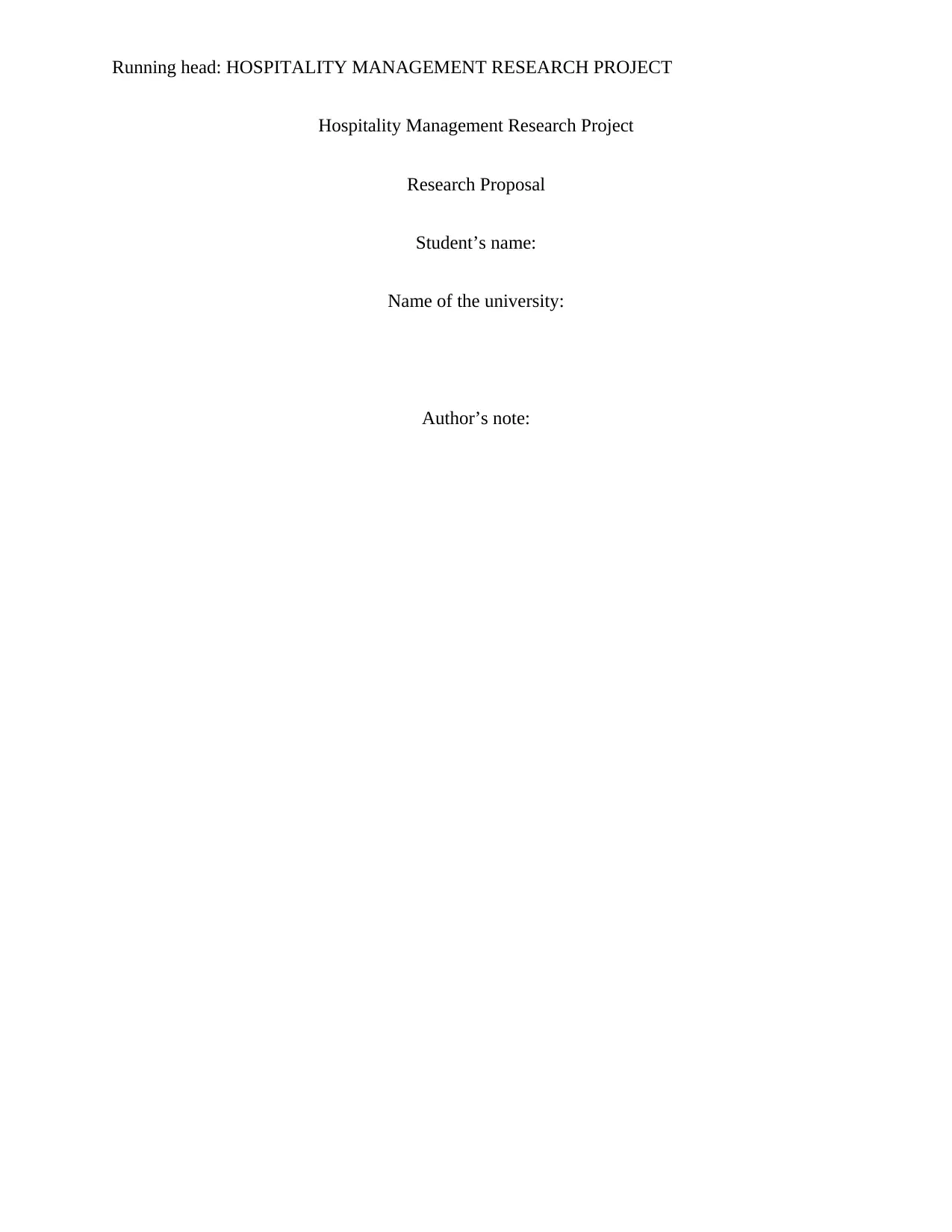
Running head: HOSPITALITY MANAGEMENT RESEARCH PROJECT
Hospitality Management Research Project
Research Proposal
Student’s name:
Name of the university:
Author’s note:
Hospitality Management Research Project
Research Proposal
Student’s name:
Name of the university:
Author’s note:
Paraphrase This Document
Need a fresh take? Get an instant paraphrase of this document with our AI Paraphraser
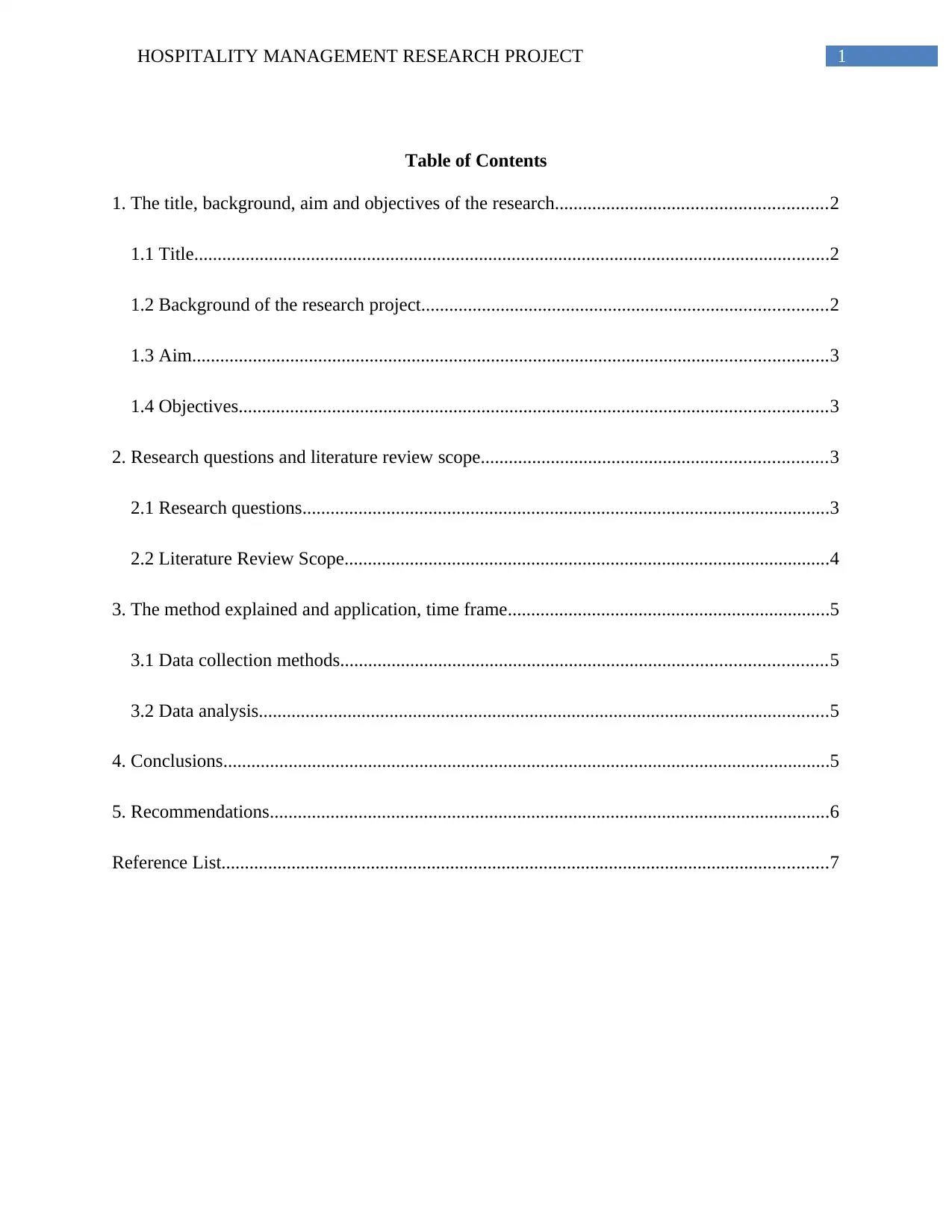
1HOSPITALITY MANAGEMENT RESEARCH PROJECT
Table of Contents
1. The title, background, aim and objectives of the research..........................................................2
1.1 Title........................................................................................................................................2
1.2 Background of the research project.......................................................................................2
1.3 Aim........................................................................................................................................3
1.4 Objectives..............................................................................................................................3
2. Research questions and literature review scope..........................................................................3
2.1 Research questions.................................................................................................................3
2.2 Literature Review Scope........................................................................................................4
3. The method explained and application, time frame.....................................................................5
3.1 Data collection methods........................................................................................................5
3.2 Data analysis..........................................................................................................................5
4. Conclusions..................................................................................................................................5
5. Recommendations........................................................................................................................6
Reference List..................................................................................................................................7
Table of Contents
1. The title, background, aim and objectives of the research..........................................................2
1.1 Title........................................................................................................................................2
1.2 Background of the research project.......................................................................................2
1.3 Aim........................................................................................................................................3
1.4 Objectives..............................................................................................................................3
2. Research questions and literature review scope..........................................................................3
2.1 Research questions.................................................................................................................3
2.2 Literature Review Scope........................................................................................................4
3. The method explained and application, time frame.....................................................................5
3.1 Data collection methods........................................................................................................5
3.2 Data analysis..........................................................................................................................5
4. Conclusions..................................................................................................................................5
5. Recommendations........................................................................................................................6
Reference List..................................................................................................................................7
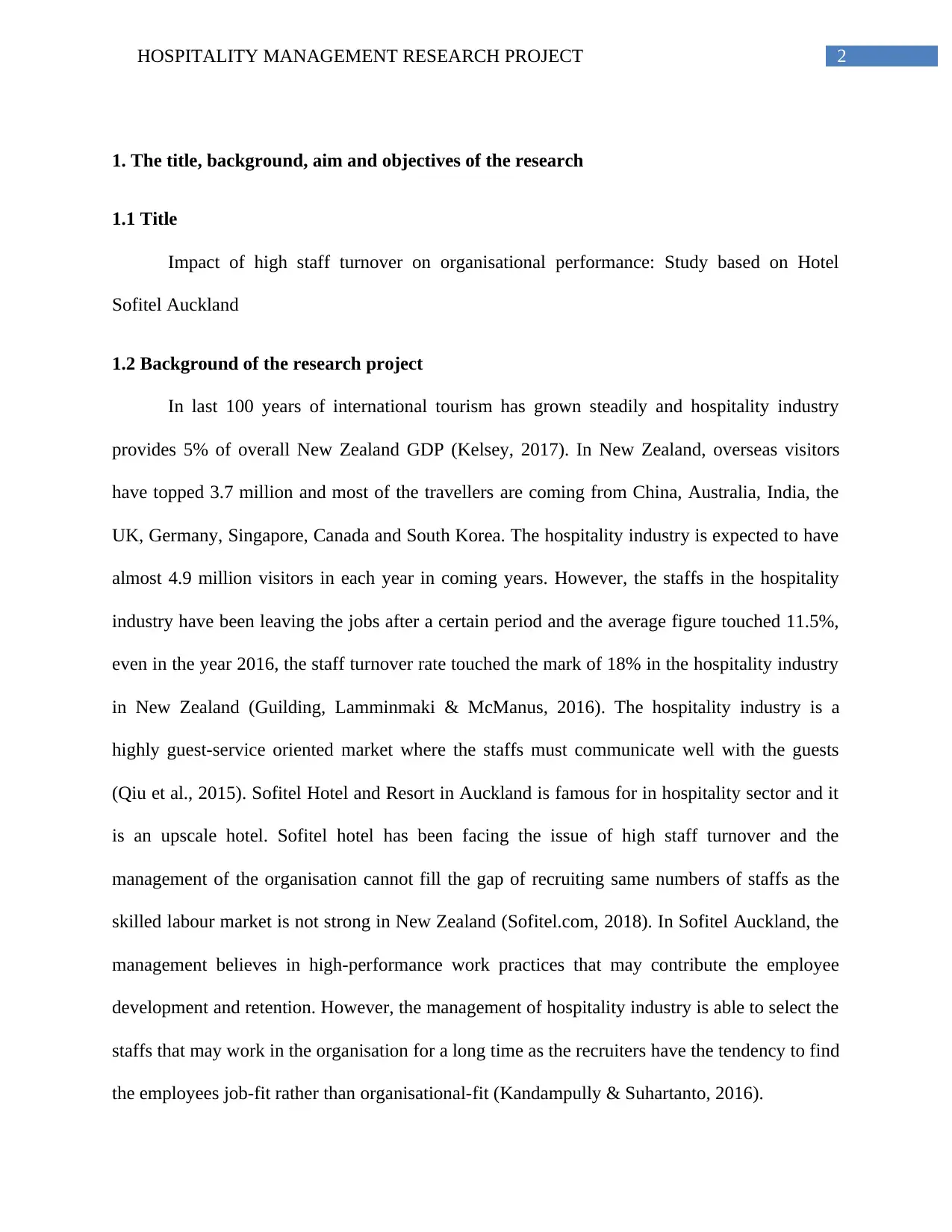
2HOSPITALITY MANAGEMENT RESEARCH PROJECT
1. The title, background, aim and objectives of the research
1.1 Title
Impact of high staff turnover on organisational performance: Study based on Hotel
Sofitel Auckland
1.2 Background of the research project
In last 100 years of international tourism has grown steadily and hospitality industry
provides 5% of overall New Zealand GDP (Kelsey, 2017). In New Zealand, overseas visitors
have topped 3.7 million and most of the travellers are coming from China, Australia, India, the
UK, Germany, Singapore, Canada and South Korea. The hospitality industry is expected to have
almost 4.9 million visitors in each year in coming years. However, the staffs in the hospitality
industry have been leaving the jobs after a certain period and the average figure touched 11.5%,
even in the year 2016, the staff turnover rate touched the mark of 18% in the hospitality industry
in New Zealand (Guilding, Lamminmaki & McManus, 2016). The hospitality industry is a
highly guest-service oriented market where the staffs must communicate well with the guests
(Qiu et al., 2015). Sofitel Hotel and Resort in Auckland is famous for in hospitality sector and it
is an upscale hotel. Sofitel hotel has been facing the issue of high staff turnover and the
management of the organisation cannot fill the gap of recruiting same numbers of staffs as the
skilled labour market is not strong in New Zealand (Sofitel.com, 2018). In Sofitel Auckland, the
management believes in high-performance work practices that may contribute the employee
development and retention. However, the management of hospitality industry is able to select the
staffs that may work in the organisation for a long time as the recruiters have the tendency to find
the employees job-fit rather than organisational-fit (Kandampully & Suhartanto, 2016).
1. The title, background, aim and objectives of the research
1.1 Title
Impact of high staff turnover on organisational performance: Study based on Hotel
Sofitel Auckland
1.2 Background of the research project
In last 100 years of international tourism has grown steadily and hospitality industry
provides 5% of overall New Zealand GDP (Kelsey, 2017). In New Zealand, overseas visitors
have topped 3.7 million and most of the travellers are coming from China, Australia, India, the
UK, Germany, Singapore, Canada and South Korea. The hospitality industry is expected to have
almost 4.9 million visitors in each year in coming years. However, the staffs in the hospitality
industry have been leaving the jobs after a certain period and the average figure touched 11.5%,
even in the year 2016, the staff turnover rate touched the mark of 18% in the hospitality industry
in New Zealand (Guilding, Lamminmaki & McManus, 2016). The hospitality industry is a
highly guest-service oriented market where the staffs must communicate well with the guests
(Qiu et al., 2015). Sofitel Hotel and Resort in Auckland is famous for in hospitality sector and it
is an upscale hotel. Sofitel hotel has been facing the issue of high staff turnover and the
management of the organisation cannot fill the gap of recruiting same numbers of staffs as the
skilled labour market is not strong in New Zealand (Sofitel.com, 2018). In Sofitel Auckland, the
management believes in high-performance work practices that may contribute the employee
development and retention. However, the management of hospitality industry is able to select the
staffs that may work in the organisation for a long time as the recruiters have the tendency to find
the employees job-fit rather than organisational-fit (Kandampully & Suhartanto, 2016).
⊘ This is a preview!⊘
Do you want full access?
Subscribe today to unlock all pages.

Trusted by 1+ million students worldwide
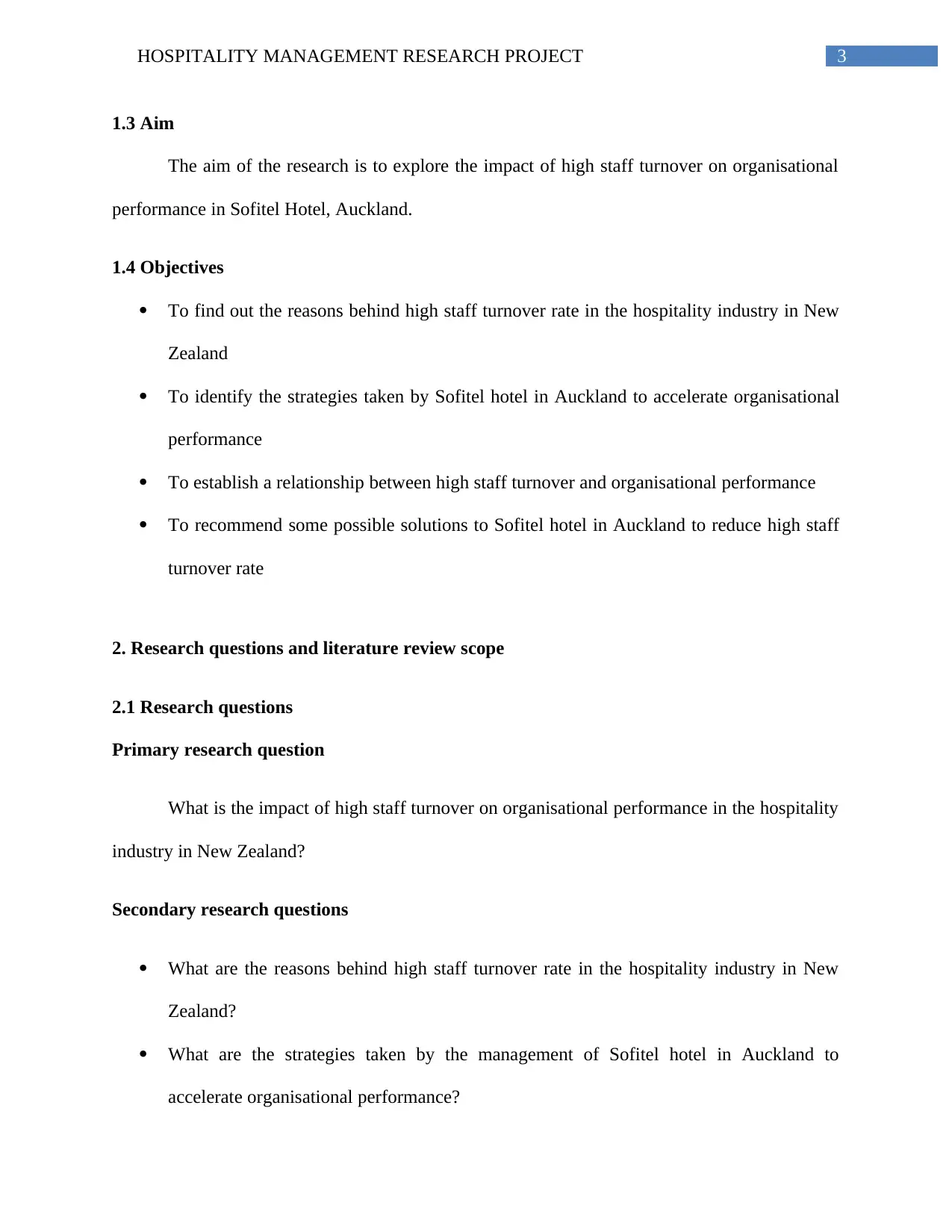
3HOSPITALITY MANAGEMENT RESEARCH PROJECT
1.3 Aim
The aim of the research is to explore the impact of high staff turnover on organisational
performance in Sofitel Hotel, Auckland.
1.4 Objectives
To find out the reasons behind high staff turnover rate in the hospitality industry in New
Zealand
To identify the strategies taken by Sofitel hotel in Auckland to accelerate organisational
performance
To establish a relationship between high staff turnover and organisational performance
To recommend some possible solutions to Sofitel hotel in Auckland to reduce high staff
turnover rate
2. Research questions and literature review scope
2.1 Research questions
Primary research question
What is the impact of high staff turnover on organisational performance in the hospitality
industry in New Zealand?
Secondary research questions
What are the reasons behind high staff turnover rate in the hospitality industry in New
Zealand?
What are the strategies taken by the management of Sofitel hotel in Auckland to
accelerate organisational performance?
1.3 Aim
The aim of the research is to explore the impact of high staff turnover on organisational
performance in Sofitel Hotel, Auckland.
1.4 Objectives
To find out the reasons behind high staff turnover rate in the hospitality industry in New
Zealand
To identify the strategies taken by Sofitel hotel in Auckland to accelerate organisational
performance
To establish a relationship between high staff turnover and organisational performance
To recommend some possible solutions to Sofitel hotel in Auckland to reduce high staff
turnover rate
2. Research questions and literature review scope
2.1 Research questions
Primary research question
What is the impact of high staff turnover on organisational performance in the hospitality
industry in New Zealand?
Secondary research questions
What are the reasons behind high staff turnover rate in the hospitality industry in New
Zealand?
What are the strategies taken by the management of Sofitel hotel in Auckland to
accelerate organisational performance?
Paraphrase This Document
Need a fresh take? Get an instant paraphrase of this document with our AI Paraphraser
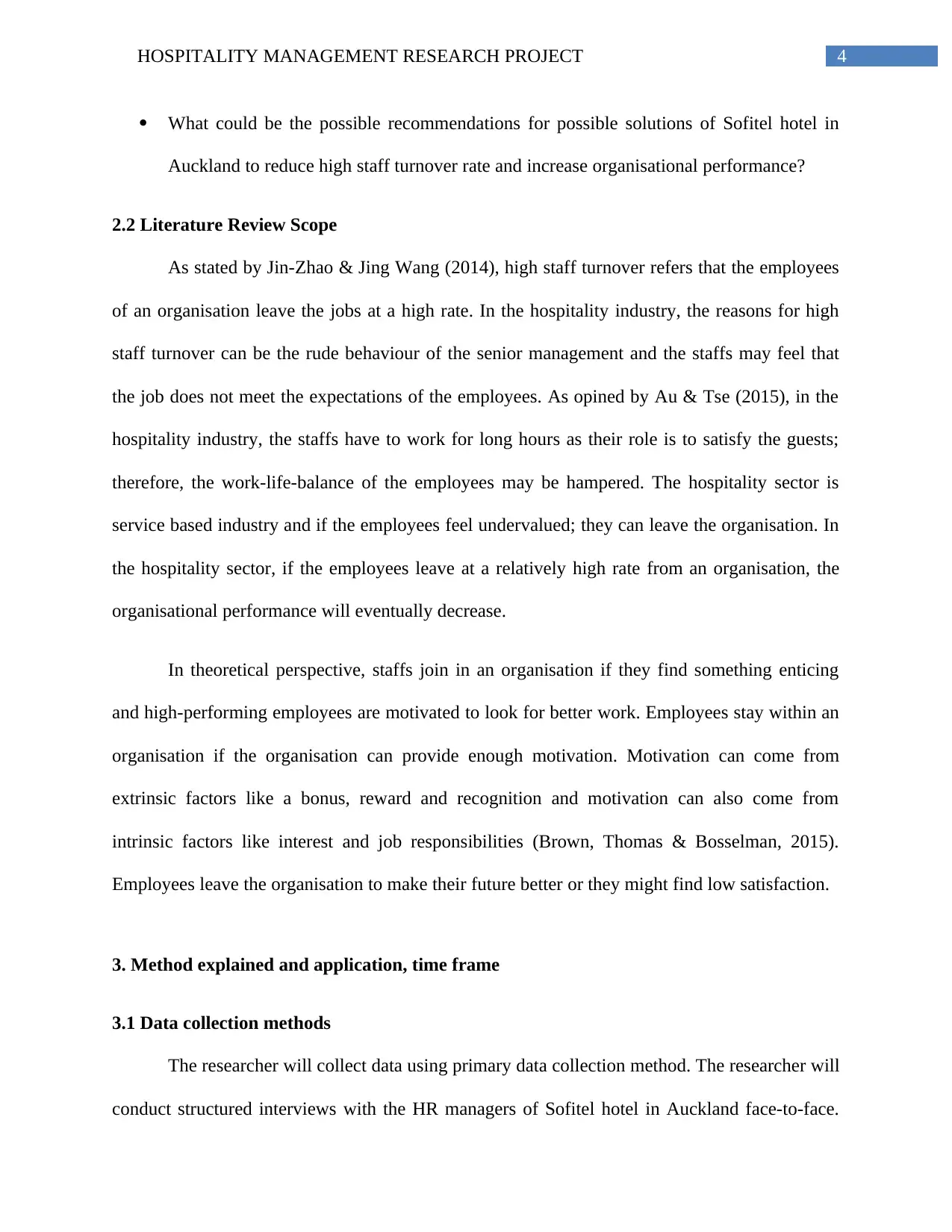
4HOSPITALITY MANAGEMENT RESEARCH PROJECT
What could be the possible recommendations for possible solutions of Sofitel hotel in
Auckland to reduce high staff turnover rate and increase organisational performance?
2.2 Literature Review Scope
As stated by Jin-Zhao & Jing Wang (2014), high staff turnover refers that the employees
of an organisation leave the jobs at a high rate. In the hospitality industry, the reasons for high
staff turnover can be the rude behaviour of the senior management and the staffs may feel that
the job does not meet the expectations of the employees. As opined by Au & Tse (2015), in the
hospitality industry, the staffs have to work for long hours as their role is to satisfy the guests;
therefore, the work-life-balance of the employees may be hampered. The hospitality sector is
service based industry and if the employees feel undervalued; they can leave the organisation. In
the hospitality sector, if the employees leave at a relatively high rate from an organisation, the
organisational performance will eventually decrease.
In theoretical perspective, staffs join in an organisation if they find something enticing
and high-performing employees are motivated to look for better work. Employees stay within an
organisation if the organisation can provide enough motivation. Motivation can come from
extrinsic factors like a bonus, reward and recognition and motivation can also come from
intrinsic factors like interest and job responsibilities (Brown, Thomas & Bosselman, 2015).
Employees leave the organisation to make their future better or they might find low satisfaction.
3. Method explained and application, time frame
3.1 Data collection methods
The researcher will collect data using primary data collection method. The researcher will
conduct structured interviews with the HR managers of Sofitel hotel in Auckland face-to-face.
What could be the possible recommendations for possible solutions of Sofitel hotel in
Auckland to reduce high staff turnover rate and increase organisational performance?
2.2 Literature Review Scope
As stated by Jin-Zhao & Jing Wang (2014), high staff turnover refers that the employees
of an organisation leave the jobs at a high rate. In the hospitality industry, the reasons for high
staff turnover can be the rude behaviour of the senior management and the staffs may feel that
the job does not meet the expectations of the employees. As opined by Au & Tse (2015), in the
hospitality industry, the staffs have to work for long hours as their role is to satisfy the guests;
therefore, the work-life-balance of the employees may be hampered. The hospitality sector is
service based industry and if the employees feel undervalued; they can leave the organisation. In
the hospitality sector, if the employees leave at a relatively high rate from an organisation, the
organisational performance will eventually decrease.
In theoretical perspective, staffs join in an organisation if they find something enticing
and high-performing employees are motivated to look for better work. Employees stay within an
organisation if the organisation can provide enough motivation. Motivation can come from
extrinsic factors like a bonus, reward and recognition and motivation can also come from
intrinsic factors like interest and job responsibilities (Brown, Thomas & Bosselman, 2015).
Employees leave the organisation to make their future better or they might find low satisfaction.
3. Method explained and application, time frame
3.1 Data collection methods
The researcher will collect data using primary data collection method. The researcher will
conduct structured interviews with the HR managers of Sofitel hotel in Auckland face-to-face.
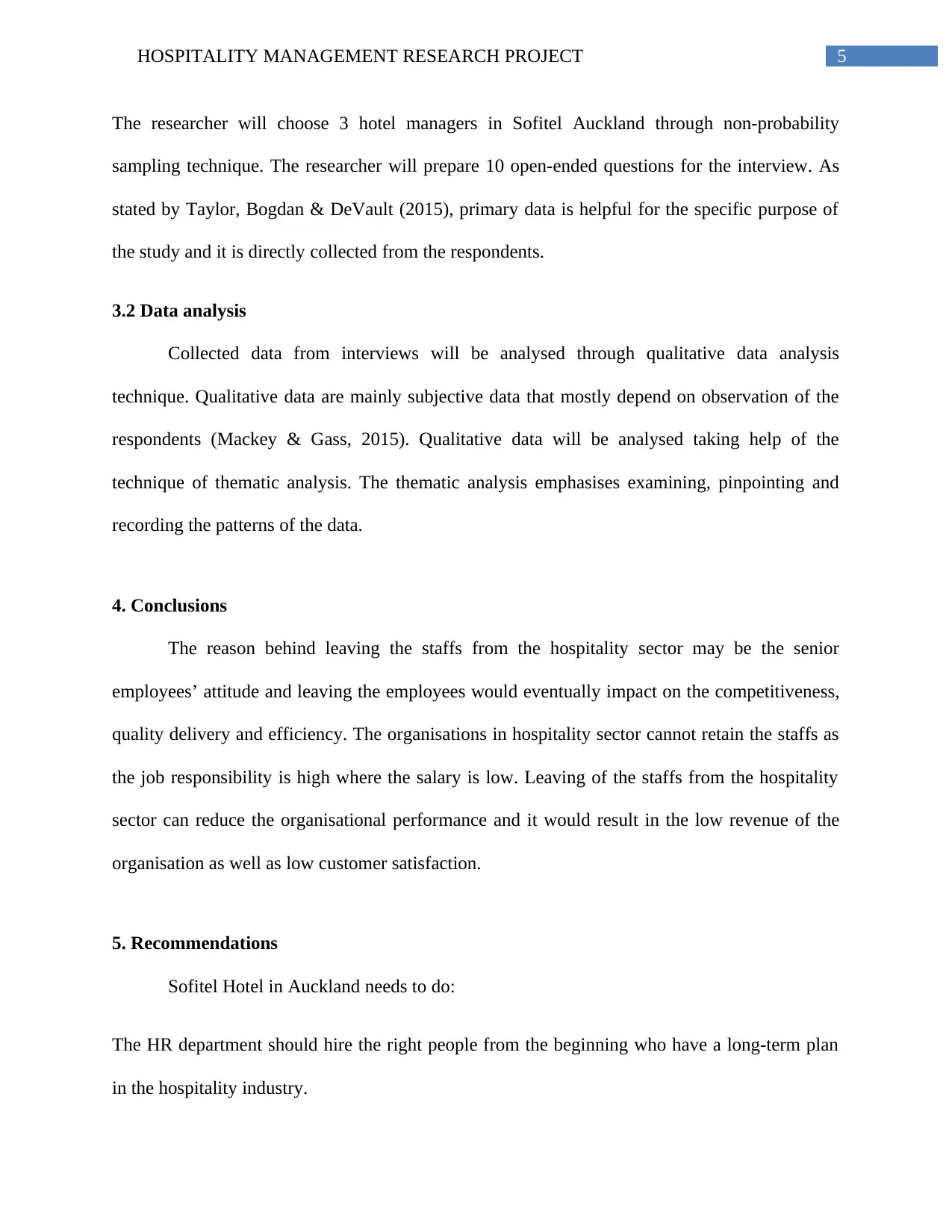
5HOSPITALITY MANAGEMENT RESEARCH PROJECT
The researcher will choose 3 hotel managers in Sofitel Auckland through non-probability
sampling technique. The researcher will prepare 10 open-ended questions for the interview. As
stated by Taylor, Bogdan & DeVault (2015), primary data is helpful for the specific purpose of
the study and it is directly collected from the respondents.
3.2 Data analysis
Collected data from interviews will be analysed through qualitative data analysis
technique. Qualitative data are mainly subjective data that mostly depend on observation of the
respondents (Mackey & Gass, 2015). Qualitative data will be analysed taking help of the
technique of thematic analysis. The thematic analysis emphasises examining, pinpointing and
recording the patterns of the data.
4. Conclusions
The reason behind leaving the staffs from the hospitality sector may be the senior
employees’ attitude and leaving the employees would eventually impact on the competitiveness,
quality delivery and efficiency. The organisations in hospitality sector cannot retain the staffs as
the job responsibility is high where the salary is low. Leaving of the staffs from the hospitality
sector can reduce the organisational performance and it would result in the low revenue of the
organisation as well as low customer satisfaction.
5. Recommendations
Sofitel Hotel in Auckland needs to do:
The HR department should hire the right people from the beginning who have a long-term plan
in the hospitality industry.
The researcher will choose 3 hotel managers in Sofitel Auckland through non-probability
sampling technique. The researcher will prepare 10 open-ended questions for the interview. As
stated by Taylor, Bogdan & DeVault (2015), primary data is helpful for the specific purpose of
the study and it is directly collected from the respondents.
3.2 Data analysis
Collected data from interviews will be analysed through qualitative data analysis
technique. Qualitative data are mainly subjective data that mostly depend on observation of the
respondents (Mackey & Gass, 2015). Qualitative data will be analysed taking help of the
technique of thematic analysis. The thematic analysis emphasises examining, pinpointing and
recording the patterns of the data.
4. Conclusions
The reason behind leaving the staffs from the hospitality sector may be the senior
employees’ attitude and leaving the employees would eventually impact on the competitiveness,
quality delivery and efficiency. The organisations in hospitality sector cannot retain the staffs as
the job responsibility is high where the salary is low. Leaving of the staffs from the hospitality
sector can reduce the organisational performance and it would result in the low revenue of the
organisation as well as low customer satisfaction.
5. Recommendations
Sofitel Hotel in Auckland needs to do:
The HR department should hire the right people from the beginning who have a long-term plan
in the hospitality industry.
⊘ This is a preview!⊘
Do you want full access?
Subscribe today to unlock all pages.

Trusted by 1+ million students worldwide
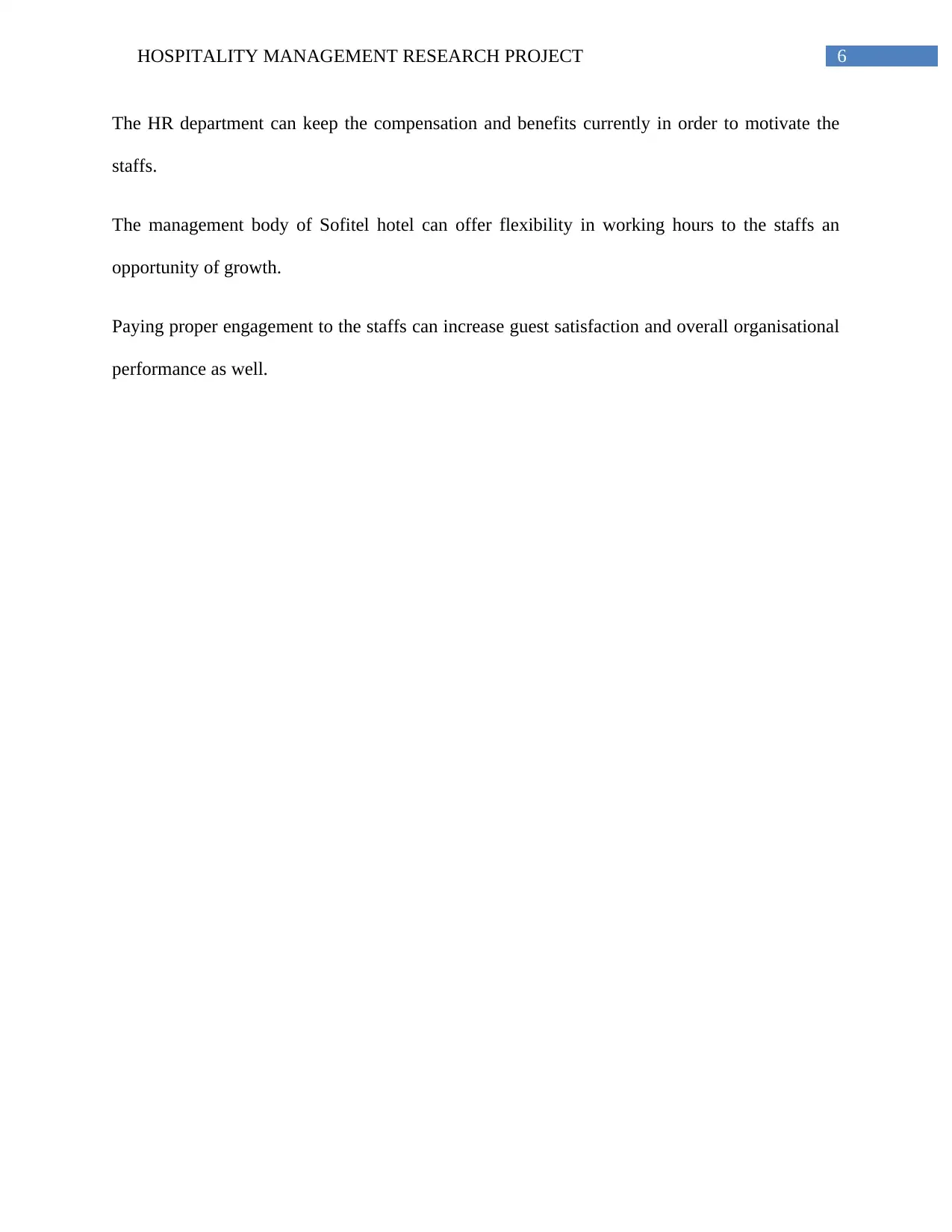
6HOSPITALITY MANAGEMENT RESEARCH PROJECT
The HR department can keep the compensation and benefits currently in order to motivate the
staffs.
The management body of Sofitel hotel can offer flexibility in working hours to the staffs an
opportunity of growth.
Paying proper engagement to the staffs can increase guest satisfaction and overall organisational
performance as well.
The HR department can keep the compensation and benefits currently in order to motivate the
staffs.
The management body of Sofitel hotel can offer flexibility in working hours to the staffs an
opportunity of growth.
Paying proper engagement to the staffs can increase guest satisfaction and overall organisational
performance as well.
Paraphrase This Document
Need a fresh take? Get an instant paraphrase of this document with our AI Paraphraser
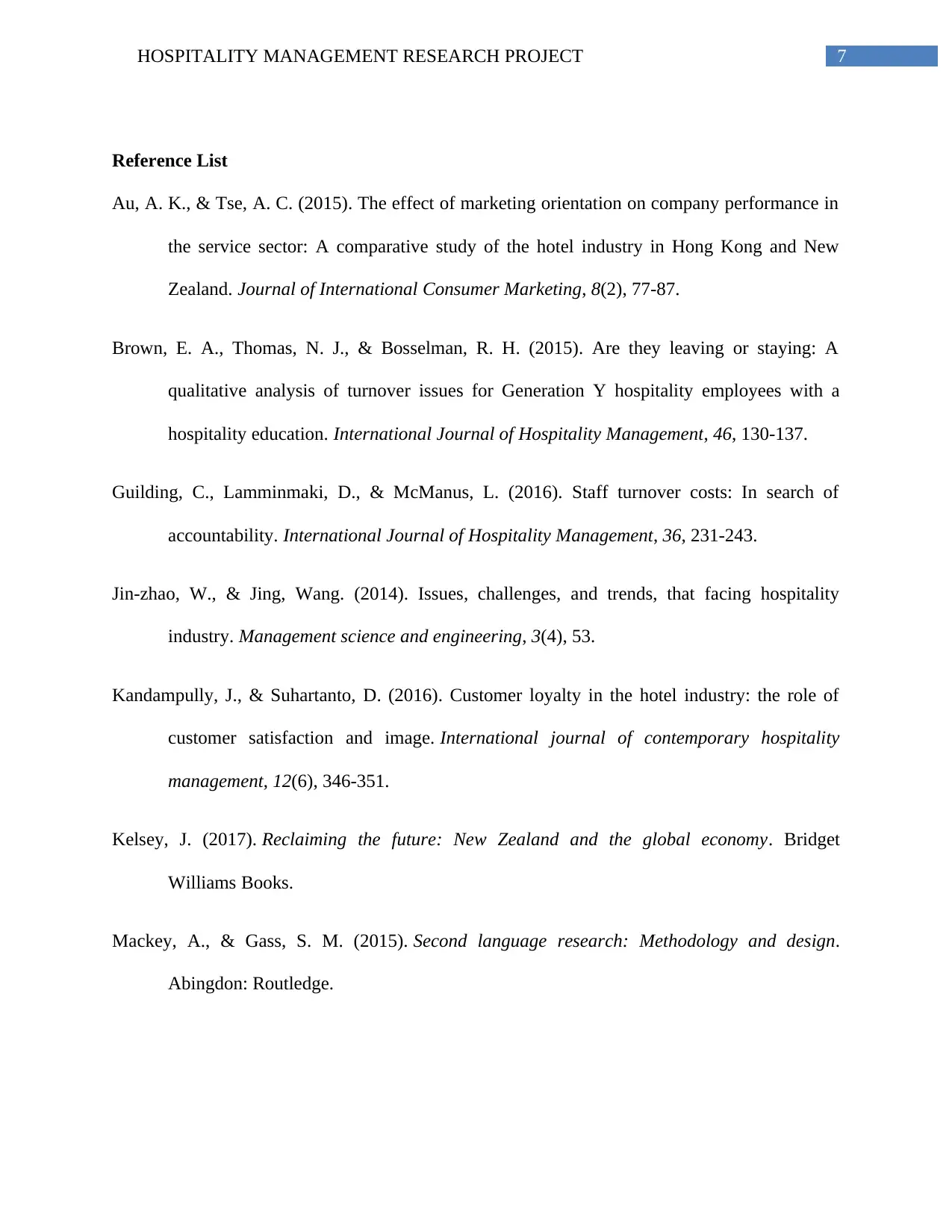
7HOSPITALITY MANAGEMENT RESEARCH PROJECT
Reference List
Au, A. K., & Tse, A. C. (2015). The effect of marketing orientation on company performance in
the service sector: A comparative study of the hotel industry in Hong Kong and New
Zealand. Journal of International Consumer Marketing, 8(2), 77-87.
Brown, E. A., Thomas, N. J., & Bosselman, R. H. (2015). Are they leaving or staying: A
qualitative analysis of turnover issues for Generation Y hospitality employees with a
hospitality education. International Journal of Hospitality Management, 46, 130-137.
Guilding, C., Lamminmaki, D., & McManus, L. (2016). Staff turnover costs: In search of
accountability. International Journal of Hospitality Management, 36, 231-243.
Jin-zhao, W., & Jing, Wang. (2014). Issues, challenges, and trends, that facing hospitality
industry. Management science and engineering, 3(4), 53.
Kandampully, J., & Suhartanto, D. (2016). Customer loyalty in the hotel industry: the role of
customer satisfaction and image. International journal of contemporary hospitality
management, 12(6), 346-351.
Kelsey, J. (2017). Reclaiming the future: New Zealand and the global economy. Bridget
Williams Books.
Mackey, A., & Gass, S. M. (2015). Second language research: Methodology and design.
Abingdon: Routledge.
Reference List
Au, A. K., & Tse, A. C. (2015). The effect of marketing orientation on company performance in
the service sector: A comparative study of the hotel industry in Hong Kong and New
Zealand. Journal of International Consumer Marketing, 8(2), 77-87.
Brown, E. A., Thomas, N. J., & Bosselman, R. H. (2015). Are they leaving or staying: A
qualitative analysis of turnover issues for Generation Y hospitality employees with a
hospitality education. International Journal of Hospitality Management, 46, 130-137.
Guilding, C., Lamminmaki, D., & McManus, L. (2016). Staff turnover costs: In search of
accountability. International Journal of Hospitality Management, 36, 231-243.
Jin-zhao, W., & Jing, Wang. (2014). Issues, challenges, and trends, that facing hospitality
industry. Management science and engineering, 3(4), 53.
Kandampully, J., & Suhartanto, D. (2016). Customer loyalty in the hotel industry: the role of
customer satisfaction and image. International journal of contemporary hospitality
management, 12(6), 346-351.
Kelsey, J. (2017). Reclaiming the future: New Zealand and the global economy. Bridget
Williams Books.
Mackey, A., & Gass, S. M. (2015). Second language research: Methodology and design.
Abingdon: Routledge.
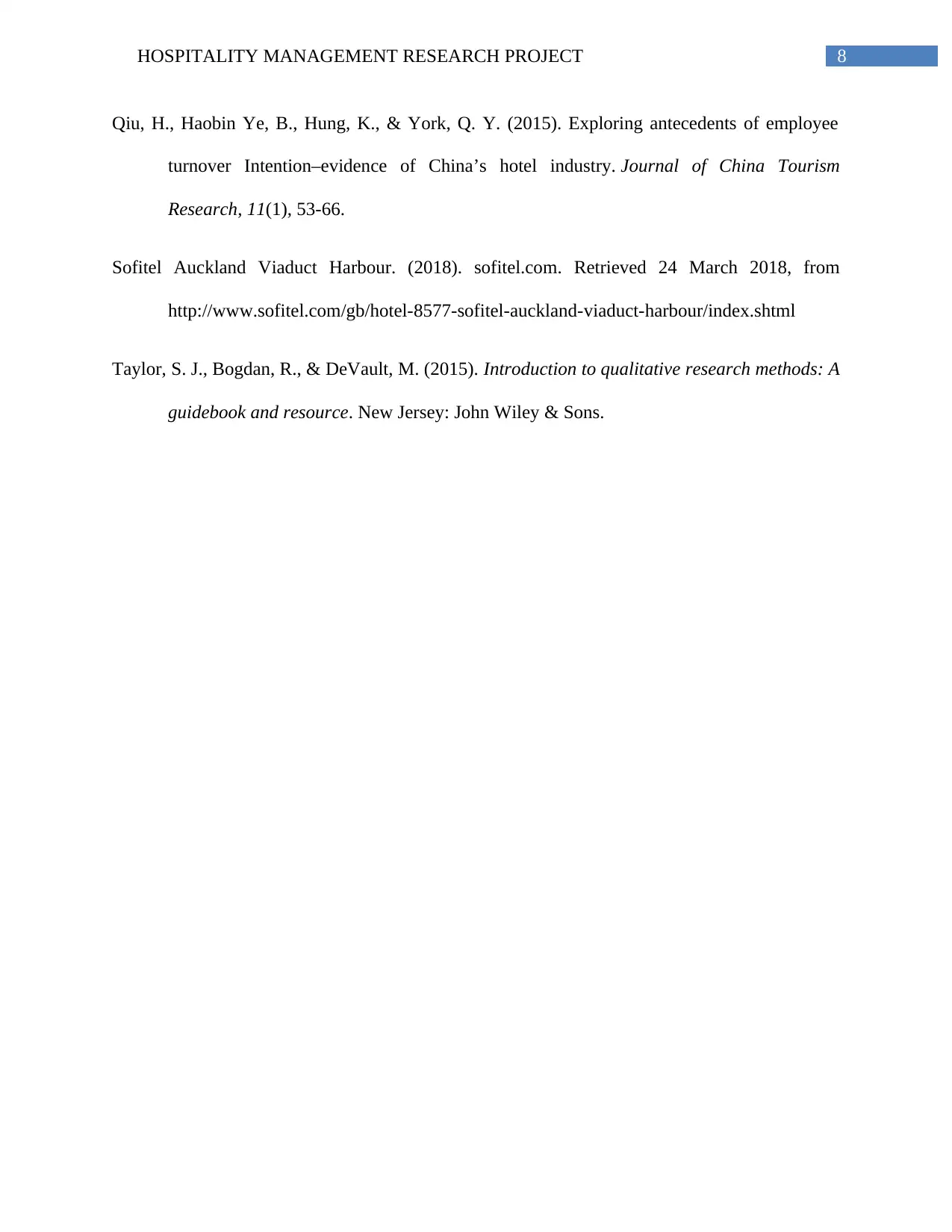
8HOSPITALITY MANAGEMENT RESEARCH PROJECT
Qiu, H., Haobin Ye, B., Hung, K., & York, Q. Y. (2015). Exploring antecedents of employee
turnover Intention–evidence of China’s hotel industry. Journal of China Tourism
Research, 11(1), 53-66.
Sofitel Auckland Viaduct Harbour. (2018). sofitel.com. Retrieved 24 March 2018, from
http://www.sofitel.com/gb/hotel-8577-sofitel-auckland-viaduct-harbour/index.shtml
Taylor, S. J., Bogdan, R., & DeVault, M. (2015). Introduction to qualitative research methods: A
guidebook and resource. New Jersey: John Wiley & Sons.
Qiu, H., Haobin Ye, B., Hung, K., & York, Q. Y. (2015). Exploring antecedents of employee
turnover Intention–evidence of China’s hotel industry. Journal of China Tourism
Research, 11(1), 53-66.
Sofitel Auckland Viaduct Harbour. (2018). sofitel.com. Retrieved 24 March 2018, from
http://www.sofitel.com/gb/hotel-8577-sofitel-auckland-viaduct-harbour/index.shtml
Taylor, S. J., Bogdan, R., & DeVault, M. (2015). Introduction to qualitative research methods: A
guidebook and resource. New Jersey: John Wiley & Sons.
⊘ This is a preview!⊘
Do you want full access?
Subscribe today to unlock all pages.

Trusted by 1+ million students worldwide
1 out of 9
Related Documents
Your All-in-One AI-Powered Toolkit for Academic Success.
+13062052269
info@desklib.com
Available 24*7 on WhatsApp / Email
![[object Object]](/_next/static/media/star-bottom.7253800d.svg)
Unlock your academic potential
Copyright © 2020–2026 A2Z Services. All Rights Reserved. Developed and managed by ZUCOL.





